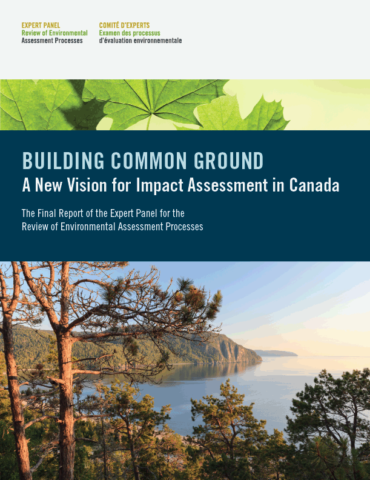 Last week, the Expert Panel for the Review of Environmental Assessment Processes report, Building Common Ground: A New Vision for Impact Assessment in Canada, was released. The Report sets out recommendations for how the federal environmental assessment (EA) process should be reformed. Public comments are due by May 5, 2017, and can be submitted at LetsTalkEA.ca.
Last week, the Expert Panel for the Review of Environmental Assessment Processes report, Building Common Ground: A New Vision for Impact Assessment in Canada, was released. The Report sets out recommendations for how the federal environmental assessment (EA) process should be reformed. Public comments are due by May 5, 2017, and can be submitted at LetsTalkEA.ca.
The Minister of Environment and Climate Change established the Expert Panel in August 2016. The Canadian Environmental Assessment Act, 2012, is one of four acts under review. The others are the National Energy Board Act, the Fisheries Act, and the Navigation Protection Act. These acts were dramatically changed by the previous government in 2012. The Parliamentary Committee reviews’ of the Fisheries Act and the Navigation Protection Act were completed in February and March. The Expert Panel review of the NEB Act is still ongoing.
Before writing its report, the Review Panel visited 21 cities between September and December 2016, heard 397 presentations and received 520 written submissions and 2673 ChoiceBook responses. The Panel also received advice from a Multi-Interest Advisory Committee and an Advisory Committee of eight EA specialists. It also commissioned studies on various EA topics.
Reading Building Common Ground makes it clear the Expert Panel meaningfully considered the advice and public input it received and put a great deal of time and thought into its report.
Some of the highlights of the report and Expert Panel recommendations that EcoNews readers should support, include:
- “Environmental Assessment” (EA) should become “Impact Assessment” (IA). EA tends to be focused on the biophysical impacts of projects. IA is purposefully broader and is proposed by the Panel to capture all the positive and negative environmental, social, economic, health, and cultural impacts of a project.
- Moving to “next-generation” EA. The present focus of EA is determining whether a project will cause “significant impacts”. The Expert Panel recommends that the test for IA should be whether a project contributes positively to sustainability. West Coast Environmental Law has defined this as being, “Will this proposal relative to other reasonable options make the best net contribution to lasting environmental, social and economic well-being without demanding trade-offs that entail significant adverse effects?”
- That Indigenous Peoples be included in decision-making at all stages of IA, in accordance with their own laws and customs. This includes incorporating the principles of the UN Declaration on the Rights of Indigenous Peoples (UNDRIP) into IA.
- Improving public participation so that consensus-based decisions on projects are reached. The Panel’s guiding principles of IA are that these processes must be transparent, inclusive, informed, and meaningful.
- Involving the public in the earliest stages of project planning.
- Incorporating more rigourous science into EA/IA.
- Improved post-project monitoring and follow-up.
- Having assessment reports prepared by neutral parties, with input from all participants. This is a dramatic change from the current practice of self-assessment in which project proponents pay for and prepare their own assessment reports.
- Strengthening the role of strategic and regional environmental assessments.
- Bringing the conduct of IA under the control of one agency and ending the currently problematic and heavily criticized practice of some EAs being conducted by the National Energy Board and Canadian Nuclear Safety Commission.
Others, such as environmental groups and EA experts and academics, are currently analyzing the Expert Panel’s report. For now, some of CCNB’s concerns with the report include:
- The focus of the Panel’s recommended IA process is only on “large” projects. Projects that don’t have “consequential” impacts (not clearly defined by the Panel) would not be assessed. This overlooks the fact that many small projects can cumulatively cause large impacts.
- Having only a list of projects that are to be assessed. The Panel also recommends that there be a way for people to ask for the assessment of an unlisted project that still might cause consequential impacts. However, there is no proposal for the listing or registration of unlisted projects. As such, it is unclear how people will receive early or any notice of unlisted projects or how unlisted and therefore unassessed projects will be kept track of.
- The “Just say no!” option to projects is not made explicitly enough, often enough by the Panel. There still seems to be a bias towards the idea that every project has merit and therefore should be fully assessed.
